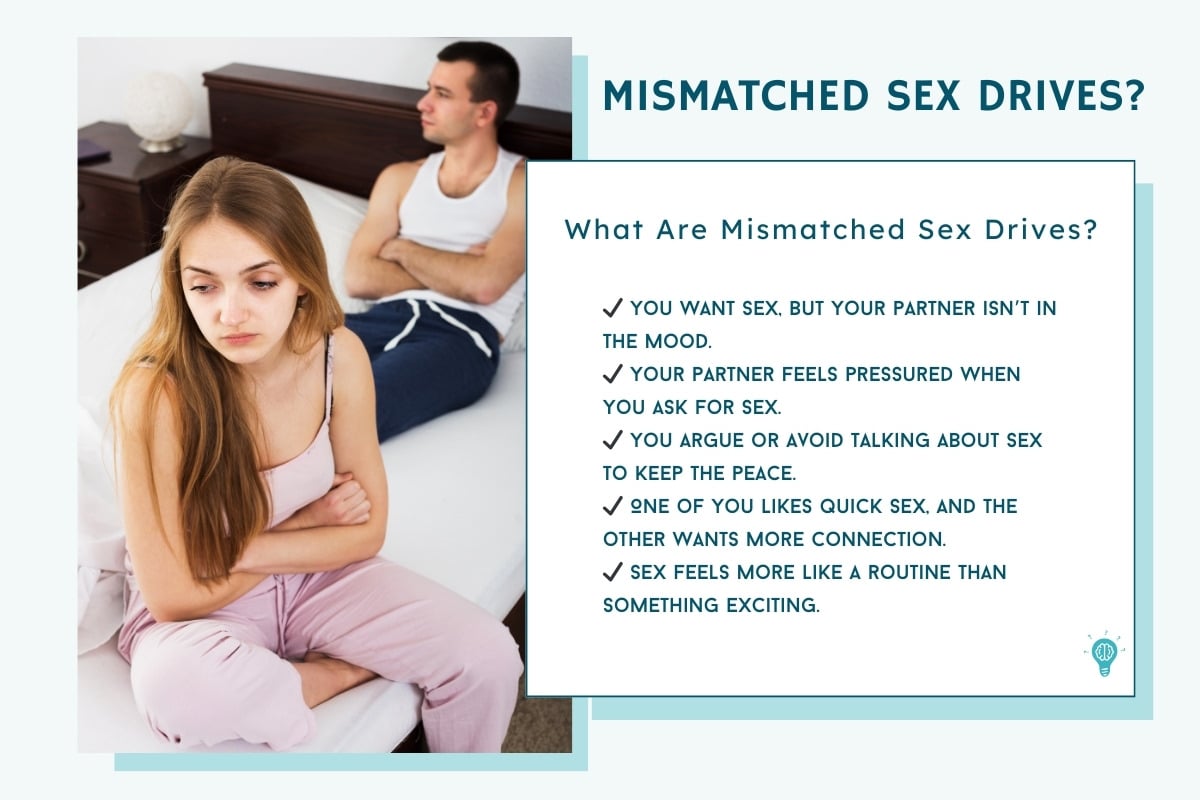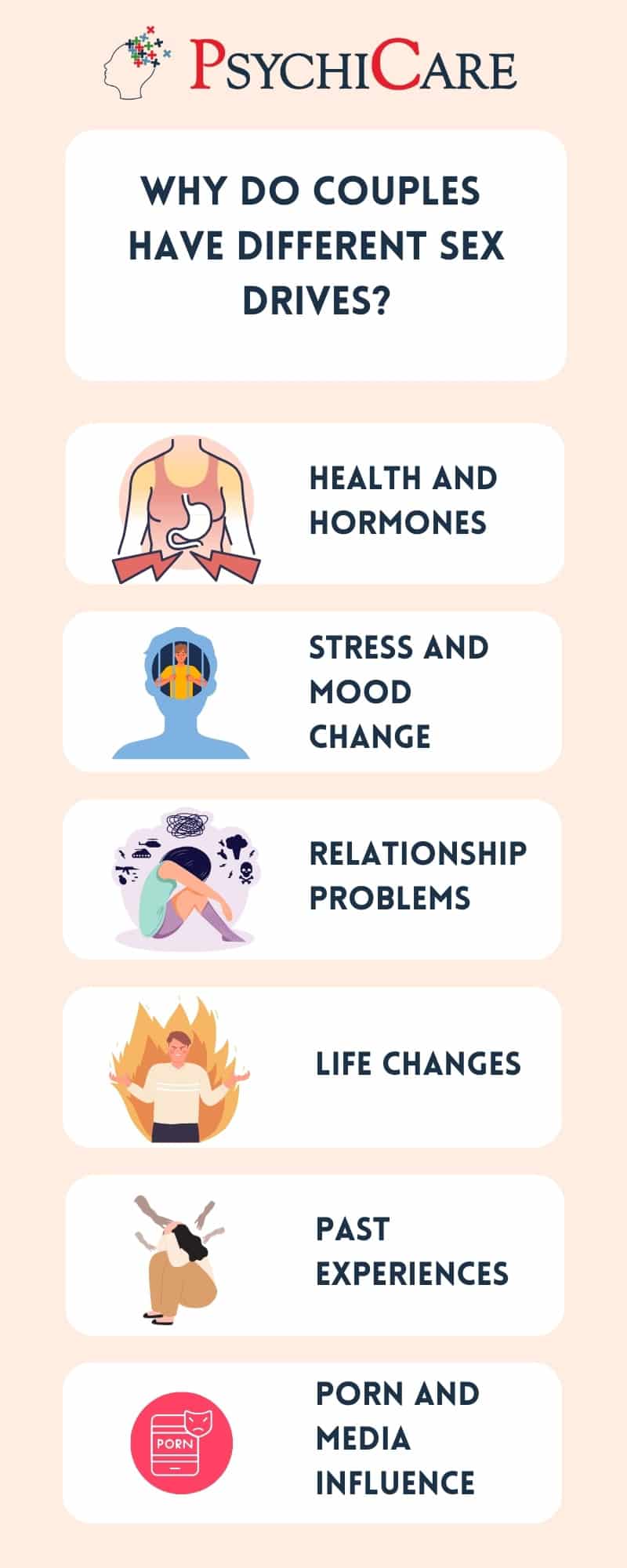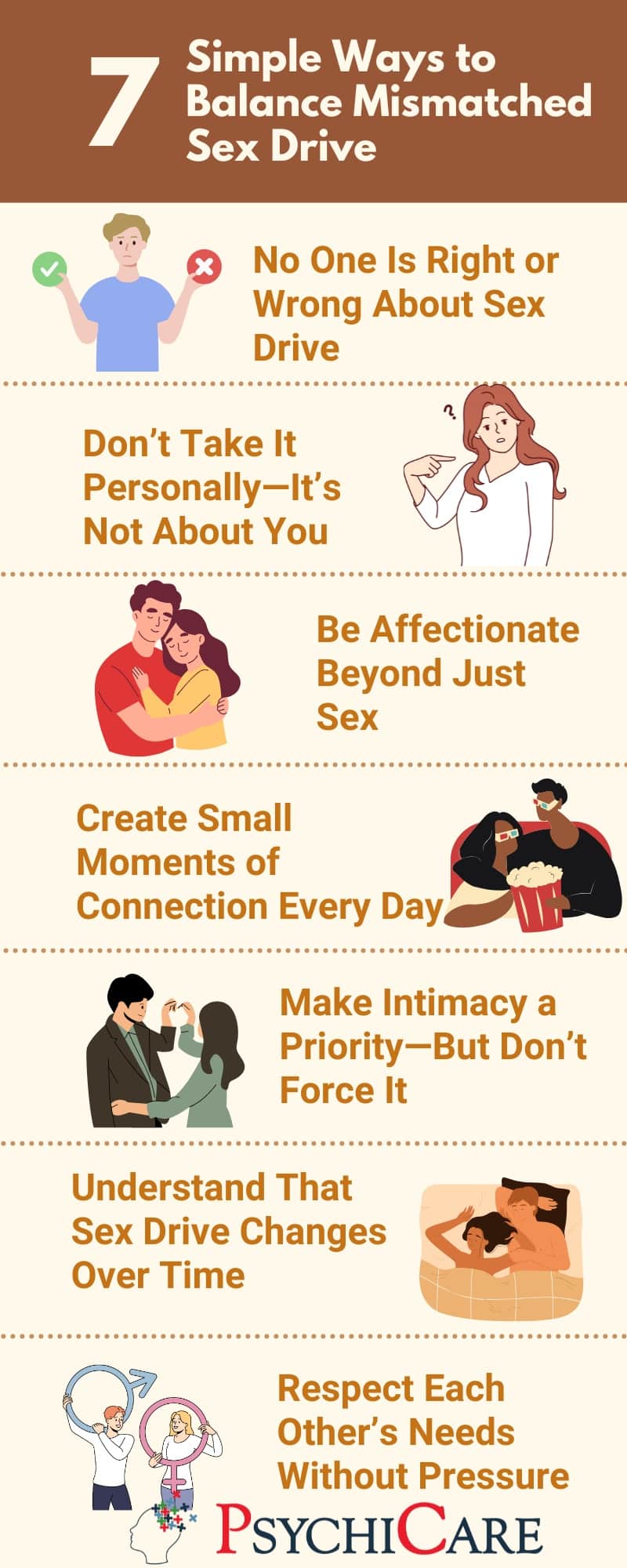I’m a sexologist, and I hear this from couples all the time—you and your partner used to be all over each other, but now? One of you wants sex way more than the other. And it’s causing problems.
Maybe you’re the one who’s always in the mood, but your partner keeps turning you down. Or maybe you’re the one who never feels like it, and now your partner is frustrated. Either way, it leads to silent nights, awkward conversations, or even full-blown fights.
Take Sahi* and her partner.
She wants sex every day. He could go months without it.
“We’ve gone six months without having sex,” she says. “On average, maybe once every two months.”
She feels rejected. He feels pressured. “I have a high-stress job. I don’t even think about it,” he tells her.
Sound familiar? You’re not alone. Research shows that about 50% of couples have sex weekly, but many barely touch each other. Some are fine with that. Others start feeling more like roommates than lovers.
So, what happens when you and your partner don’t have the same sex drive? Can you fix it? Or are you stuck like this forever?
What Are Mismatched Sex Drives?
Mismatched sex drives mean you and your partner don’t want sex the same way or as often. Maybe you feel ready every day, but your partner rarely thinks about it. Or you need cuddles and deep talks first, while they’re good to go anytime. This difference can cause hurt feelings, stress, and even fights—but it doesn’t have to.
✔ You want sex, but your partner isn’t in the mood.
✔ Your partner feels pressured when you ask for sex.
✔ You argue or avoid talking about sex to keep the peace.
✔ One of you likes quick sex, and the other wants more connection.
✔ Sex feels more like a routine than something exciting.

Why Do Couples Have Different Sex Drives?
At the start, you couldn’t keep your hands off each other. Kissing in the kitchen, sneaking off at parties, barely making it to the bedroom. Now, one of you is always in the mood, and the other just wants to sleep.
This shift doesn’t mean something is wrong. It’s just life. Work, stress, health, and even small habits can change how often you crave sex.
How Health and Hormones Affect Sex Drive
One week, you’re all over each other. The next, you barely think about it. Hormones play a huge role in this.
Birth control, pregnancy, aging, and even medication can change how your body responds to desire. A client once panicked because her husband stopped initiating sex. Turns out, his new anxiety meds were lowering his libido.
How Stress and Mood Change Your Desire
You’re exhausted. Your mind is racing. Your partner wants sex, but all you want is sleep.
Stress is a mood killer. Some people use sex to relax, while others shut down completely. One couple fought constantly—she needed intimacy to feel better, but he couldn’t even think about it when work stress took over.
How Relationship Problems Affect Intimacy
It’s hard to feel sexy when you’re mad. A small fight in the morning can make you avoid each other in bed at night.
One couple I worked with used to have a great sex life. But after years of small, unresolved issues, she started pulling away. It wasn’t that she didn’t love him—she just didn’t feel close anymore.
How Life Changes Can Lower or Increase Sex Drive
Before kids, before career stress, before exhaustion, sex was easy. Now, it feels like another chore.
One couple told me their sex life disappeared after their baby was born. She felt exhausted. He felt rejected. Once they started cuddling without pressure, things slowly got better.
How Past Experiences Shape Your Sexual Needs
Your view of sex starts way before your first time. Some people grow up in open, sex-positive homes. Others never hear a word about it.
I worked with a couple where one partner hesitated to try new things. It wasn’t about their relationship—it was how they were raised. Talking about it changed everything.
How Porn and Media Influence Your Expectations
Movies make sex look effortless. Passionate. Perfect. In real life, it’s messy, awkward, and sometimes interrupted by the dog.
A guy once told me he thought something was wrong because they weren’t having sex daily like couples in shows. But real relationships aren’t scripted. The moment you stop comparing, the pressure fades.

How Mismatched Sex Drives Affect Relationships
At first, you might brush it off. One of you wants sex more, the other doesn’t. No big deal, right?
But over time, frustration builds. The one with the higher drive starts feeling rejected. The one with the lower drive feels pressured. Every touch feels like a request. Every “not tonight” feels like rejection.
When One Partner Wants Sex More Often
You try to be patient. You remind yourself that your partner loves you. But deep down, you feel like something is missing.
One client told me, “I know they love me, but I feel unwanted.” They started avoiding physical affection altogether because every hug or cuddle led to disappointment when sex didn’t happen.
When the Other Partner Feels Pressured or Unwanted
On the flip side, the partner with a lower sex drive isn’t trying to reject or hurt anyone. They just don’t feel the same level of desire.
A woman I worked with felt guilty every time her husband initiated sex. “I love him,” she said. “But sometimes, I just don’t want to. And then I feel bad because I know he does.” The pressure made her avoid intimacy altogether.
How It Can Lead to Arguments, Distance, or Cheating
Mismatched sex drives don’t ruin relationships. The way couples handle them does.
Some fight. The higher-drive partner starts keeping score—“It’s been a week.” The lower-drive partner shuts down, feeling like sex is an obligation. The distance grows.
Some seek fulfillment elsewhere. Not always in the form of cheating—sometimes through porn, fantasies, or emotional connections outside the relationship.
How It Affects Emotional and Physical Connection
Sex isn’t just about pleasure—it’s about closeness. When it stops, emotional distance follows.
One couple I worked with had gone months without sex. They didn’t talk about it. They didn’t touch. They weren’t even mad at each other—just… distant. When they finally opened up, they realized they missed holding hands, kissing, and just feeling close.
The key isn’t having sex all the time. It’s staying connected, even when desire isn’t the same.
Mismatched Sex Drives: 7 Simple Ways to Stay Close
Mismatched sex drives don’t have to mean a distant or unhappy relationship. The key is staying connected, emotionally and physically, even when your desire levels don’t match. Here’s how:
Tip #1: No One Is Right or Wrong About Sex Drive
There’s no “normal” amount of sex. Some people want it daily, others once a month. Neither is wrong. The problem starts when one person feels judged or pressured.
A couple I worked with used to argue constantly—one wanted more sex, the other felt guilty for not wanting it as much. The real shift happened when they stopped seeing their differences as a problem and started working together to find balance.
Tip #2: Don’t Take It Personally—It’s Not About You
If your partner wants sex less often, it doesn’t mean they find you unattractive. And if they want it more, it doesn’t mean they only care about sex.
A woman once told me, “I thought my husband wasn’t attracted to me anymore.” But he was just overwhelmed with work stress. Once they talked openly, she realized it wasn’t about her—it was about everything else going on in his life.
Tip #3: Be Affectionate Beyond Just Sex
If every hug feels like an invitation for sex, the lower-drive partner may start avoiding physical touch. That’s when the emotional disconnect begins.
One couple set a simple rule: more non-sexual affection. Holding hands, kissing, cuddling—without the expectation of sex. It helped rebuild closeness without pressure.
Tip #4: Create Small Moments of Connection Every Day
Sex isn’t the only way to feel close. Couples who laugh, talk, and do things together outside the bedroom tend to feel more connected inside the bedroom too.
One of my clients made a habit of sending flirty texts throughout the day—nothing sexual, just playful reminders of their bond. It changed the way they felt about each other, even before touching.
Tip #5: Make Intimacy a Priority—But Don’t Force It
Life gets busy. Stress takes over. If you don’t intentionally make time for intimacy, it often fades into the background.
One couple I worked with scheduled weekly “connection time.” Not necessarily for sex, but for uninterrupted time together—no phones, no distractions. Sometimes they had sex, sometimes they just talked. Either way, they felt closer.
Tip #6: Understand That Sex Drive Changes Over Time
At the start of a relationship, you can’t keep your hands off each other. Years later, things naturally shift. And that’s okay.
Hormones, stress, life changes—everything affects desire. Instead of panicking when things slow down, accept that sex drive isn’t fixed. It fluctuates, and that’s normal.
Tip #7: Respect Each Other’s Needs Without Pressure
No one should feel forced into sex, and no one should feel constantly rejected. Finding balance means meeting in the middle.
One couple I worked with discovered new ways to stay intimate—things like extended foreplay, erotic massages, and mutual self-pleasure. They learned that sex wasn’t the only way to feel close, and that made a huge difference.

Stop Comparing – There’s No “Normal” Sex Drive
Some people crave sex every day. Others can go weeks without thinking about it. Both are normal.
Sex drive isn’t a fixed number. It changes with age, hormones, stress, and even how much sleep you get. Testosterone, for example, plays a big role in desire. It peaks in the morning and dips at night. That’s why some people feel more in the mood when they wake up.
For women, arousal often isn’t instant. It builds with touch, emotional connection, and the right mood. Men, on the other hand, might feel desire first and look for connection later. That’s why mismatched drives happen so often.
Comparing your sex life to others won’t help. What matters is what works for you and your partner.
8 Easy Ways to Handle Mismatched Sex Drives
Talk About It Without Feeling Awkward
Sex is personal, but silence makes things worse. Be honest about what you need, without blaming your partner. Saying, “I miss being close to you,” works better than, “You never want sex anymore.”
Don’t See Differences in Sex Drive as Rejection
If your partner isn’t in the mood, it’s not about you. Stress, hormones, or exhaustion could be the real reason. Instead of feeling hurt, ask, “What would help you relax tonight?”
Find New Ways to Be Intimate That Aren’t Just Sex
Sex is important, but so is closeness. Holding hands, cuddling, or showering together keeps the bond strong. When physical touch is consistent, sex often follows naturally.
Spend Time Together, Even When You’re Not in the Mood
Laughing, watching a movie, or taking a walk can build a connection. Emotional closeness makes physical closeness easier. Feeling like a team again can reignite desire.
Balance Spontaneous and Planned Sex for More Fun
Waiting for the perfect moment might mean waiting forever. Scheduling sex sounds boring, but it actually builds excitement. Think of it like planning a date—you look forward to it.
Use Touch, Kissing, and Foreplay More Often
A quick peck on the cheek won’t spark passion. Deep kissing, slow touches, and teasing throughout the day can. The more you build anticipation, the easier it is to get in the mood.
Explore Self-Pleasure as a Healthy Outlet
Sometimes, solo time can take the pressure off the relationship. Masturbation is normal, healthy, and can even help you understand your own desires better.
Try Erotic Stories or Fantasies to Rekindle Interest
Your brain is the biggest sex organ. Reading something spicy, sharing fantasies, or watching something sensual together can reignite lost passion. Sometimes, all it takes is a little imagination.
When to Get Help from a Sex Therapist
Sometimes, mismatched sex drives aren’t just a phase—they become a real source of pain, resentment, or distance. If sex is causing more stress than pleasure, it might be time to talk to a professional.
Signs You Might Need a Sex Therapist
- Sex feels like a constant argument. You’re stuck in a cycle of rejection, pressure, or blame.
- You avoid intimacy altogether. Kissing, touching, or even sleeping in the same bed feels tense.
- One of you feels pressured. If sex feels like an obligation rather than a choice, it can damage trust.
- There’s underlying trauma. Past experiences, body image issues, or cultural beliefs may be affecting desire.
- Physical pain or medical issues are involved. A therapist can help you navigate solutions with a doctor.
- You feel more like roommates than lovers. If emotional and physical connection has faded, professional guidance can help rebuild it.
How a Sex Therapist Can Help
A sex therapist isn’t there to judge—they help you communicate, understand your desires, and find a balance that works for both of you. Whether it’s exploring different types of intimacy, addressing emotional barriers, or learning new techniques, therapy can bring you closer.
You can ask a sexologist or sex therapist at PsychiCare for an online consultation. We’ve helped hundreds of clients worldwide with great reviews and feedback. Get expert guidance for just ₹1500 per session.
What Happens in a Sex Therapy Session?
- Open Talk – You’ll discuss your relationship and sex life honestly.
- No Judgment – A safe space to share without shame or awkwardness.
- Finding the Cause – Stress, hormones, emotions—your therapist helps identify what’s affecting your sex drive.
- Practical Solutions – Tips, exercises, and new ways to connect.
- More Than Just Sex – Focus on intimacy, emotional closeness, and pleasure.
Final Thoughts: How to Stay Happy With Different Sex Drives
Mismatched sex drives don’t mean your relationship is broken. It just means you need to find balance.
Talk openly about your needs. Be honest, but avoid blaming each other.
Remember, intimacy isn’t just sex. Holding hands, cuddling, and laughing together keep the bond strong.
Sex drive isn’t set in stone. It changes with stress, health, and life events. Be patient with each other.
If sex feels like a constant struggle, PsychiCare’s sexologists and therapists can help. Online consultations start at just ₹1500 per session. Get expert advice and bring back the spark.




